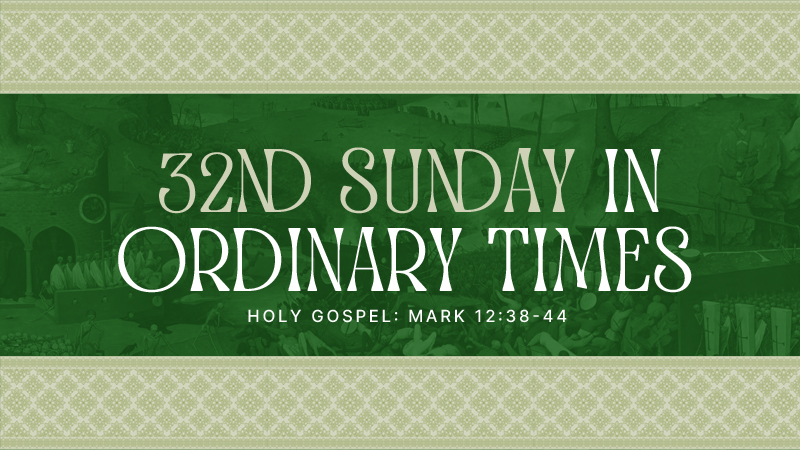Sunday Reflections | 32nd Sunday in Ordinary Times
By SIDTP SoCom
Published on November 10, 2024
In the course of His teaching, Jesus said, “Beware of the scribes, who like to go around in long robes and accept greetings in the marketplaces, seats of honor in synagogues, and places of honor at banquets.
They devour the houses of widows and, as a pretext, recite lengthy prayers. They will receive a very severe condemnation.”
He sat down opposite the treasury and observed how the crowd was putting money into the treasury. Many rich people put in large sums.
A poor widow also came and put in two small coins worth a few cents.
Calling His disciples to Him, Jesus said, “Amen, I say to you, this poor widow put in more than all the other contributors to the treasury.
For they have all contributed from their surplus wealth, but she, from her poverty, has contributed all she had, her whole livelihood.”
In today’s Gospel, we encounter two contrasting examples: the hypocrisy of the scribes and the radical generosity of a poor widow.
Jesus begins by warning His disciples to be cautious of the scribes, who outwardly appear pious and righteous. They wear long robes and seek attention in the marketplaces, expecting to be honored and praised. Yet, their actions betray their hearts. Jesus exposes how these men, despite their religious titles, take advantage of vulnerable people, especially widows, while pretending to be pious by offering long, public prayers. He warns that such hypocrisy will not go unnoticed, and they will face severe judgment.
Then, Jesus shifts focus to a scene in the temple treasury, where He observes people making their offerings. While many rich people put in large sums of money, it is the poor widow who catches His eye. She offers two small coins—hardly worth anything in human terms, but in God’s eyes, her gift is priceless.
Jesus commends her for her generosity, saying that while the wealthy gave out of their surplus, the widow gave everything she had, her whole livelihood. She didn’t give just a portion of what she had left over, but from her poverty, she gave it all. This selfless act of giving reveals her deep trust in God, and it’s this kind of wholehearted devotion that Jesus praises.
What is Jesus teaching us through these examples?
First, He warns us against the dangers of hypocrisy. It’s easy to put on a show of holiness or religiosity for others to see, but true faith is not about appearances. The scribes may have looked the part, but their actions were far from God’s will. Jesus invites us to live authentically, where our outward actions reflect a genuine love for God and others, not a desire for personal glory.
Second, Jesus highlights the importance of *sacrificial giving*. The widow’s offering, though small by worldly standards, was the greatest because it cost her everything. She didn’t give because it was easy or convenient; she gave because she trusted God completely. In this, she shows us that generosity is not measured by the amount we give but by the spirit in which we give. Jesus calls us to give from our hearts, not from our excess. This could mean giving our time, our talents, our love, or even our material resources in a way that reflects our trust in God’s provision.
Finally, the story of the widow encourages us to consider what we truly value. In a world that often values wealth, power, and status, Jesus flips this view upside down. The widow, who had little to nothing, gave everything she had because she valued her relationship with God more than anything else. For her, nothing was more important than trusting in God’s care and provision.
As we reflect on this Gospel, we might ask ourselves: Are there areas in my life where I’m tempted to seek honor or recognition, as the scribes did? Am I truly giving from my heart, or am I giving from my surplus, only when it’s convenient? How can I imitate the widow’s trust and generosity in my own life?
This Gospel challenges us to look beyond outward appearances and to focus on the heart of our relationship with God. It calls us to live with integrity, to give selflessly, and to trust God in all things. May we, like the widow, offer our whole lives—our time, our resources, and our hearts—in faithful response to God’s love.



